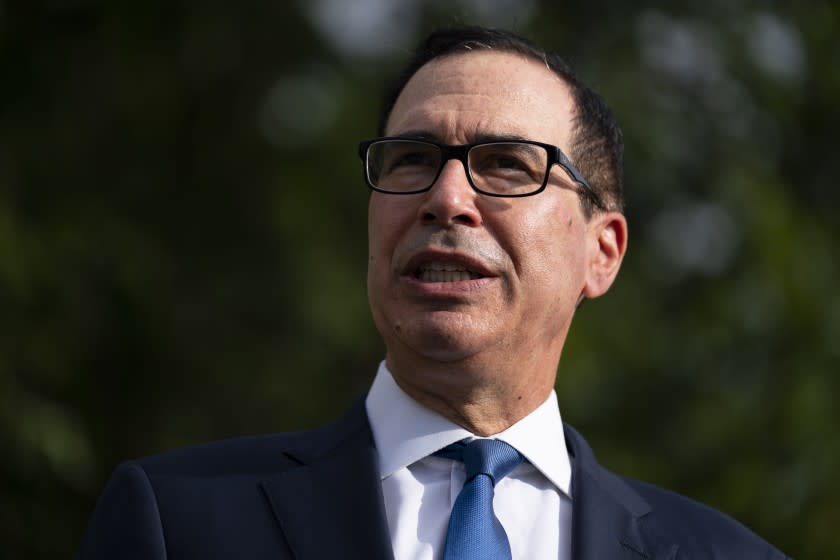As $600-a-week benefit nears end, White House suggests short-term unemployment bill

With a $600-a-week unemployment benefit expiring this week, senior White House aides continued to suggest Sunday that a jobless benefit that was too generous would discourage people from going back to work.
The officials said a stopgap bill might be needed to keep federal benefits from expiring entirely while Congress sought agreement on a broader package.
But congressional Democrats, noting that they passed a relief bill in May that had been sitting in the Republican-controlled Senate, chided the GOP for inaction.
"They're in disarray, and that delay is causing suffering for America's families," House Speaker Nancy Pelosi (D-San Francisco) said on CBS' "Face the Nation."
Democrats said any reluctance by workers to return to their jobs was overwhelmingly due to fear of catching the coronavirus, which continues to spread rapidly in many states. Nationwide, new daily infections have exceeded the 70,000 mark, and for much of the last week, the daily death toll exceeded 1,000.
Negotiations between the two parties have barely begun, largely because internal dissent among Senate Republicans and disagreements with the White House have stymied Republican efforts to produce a proposal.
Republican leaders pledged that on Monday they would unveil a broad stimulus package, estimated at $1 trillion, but it remains unclear if that plan will represent a consensus on the GOP side on all issues.
Treasury Secretary Steven Mnuchin told reporters on Capitol Hill Saturday that the GOP measure also would include a new round of $1,200 stimulus checks, to come in August.
With negotiations with congressional Democrats still ahead and likely to be contentious, Mnuchin and Mark Meadows, the White House chief of staff, both acknowledged Sunday that a narrower package might be needed to more swiftly address the unemployment-benefits question and some other elements.
“There are certain things that have time frames that are a bigger priority,” Mnuchin said on “Fox News Sunday,” adding, “We could look at doing an entire deal; we also could look at doing parts.”
In March, Congress approved the expanded federal unemployment benefits, recognizing that many state unemployment benefits are capped at a low level. The goal was to fully replace lost income for most unemployed workers.
Economists have credited the expanded benefits with keeping families above water and sustaining consumer purchasing during a period of extraordinarily high unemployment.
The benefit is set to expire at the end of this month. The bill passed by the Democratic-controlled House of Representatives in May would extend the $600 weekly benefit through January. Cutting the benefit now would damage the economy, Democrats said.
Mnuchin and Meadows, together with White House economic adviser Larry Kudlow, said a lesser benefit, capped at replacement of 70% of lost wages, would give workers more of an incentive to return to their jobs.
"Actually, a lot of people got more money staying at home than they would going back to work," Meadows said on ABC's "This Week," adding that "we're not going to extend that provision."
Kudlow, appearing on CNN’s “State of the Union,” said the 70% wage-replacement formula would be “quite generous by any standard.”
But Pelosi predicted that the need for an individual calculation of benefits for each jobless recipient would quickly gum up states’ unemployment systems, already groaning under the weight of 20 million to 30 million jobless claims. In many states, including California, workers have waited weeks to start receiving benefits.
“The reason we had $600 was its simplicity,” Pelosi said. “So why don’t we just keep it simple?”
Meadows said the federal government could help state offices cope with the technical and logistical aspects of a new benefits calculation.
“It’s our goal to make sure that it’s not antiquated computers that keep people from getting their benefits,” he said.
Meadows and Mnuchin also reiterated a longstanding White House demand that even a narrow relief measure include a measure to block most lawsuits against businesses over the coronavirus. Democrats have rejected that.
Although President Trump struck a more somber note on the pandemic last week, making the rare acknowledgement that things would likely get worse before getting better, his top aides sought to put the best face on recovery prospects.
Kudlow, in his CNN appearance, insisted that the economy was improving by “leaps and bounds.” He also said that aside from “hot spots” — including California, Texas, Florida and Arizona, which are among the country’s most populous states — the coronavirus outbreak was controlled to the point that workers should feel safe returning to their jobs.
“I think safety matters,” Kudlow told host Jake Tapper, adding: “It’s a more optimistic picture than the one you are painting.”
Pelosi, however, said the pandemic’s far-reaching economic effects had left many American families in dire straits.
“We’re right on the brink, when people are hungry in our country — children, millions of children, are food-insecure,” she said. “Many families who never thought they'd go to a food bank are going to food banks. And we need more money for food stamps and emergency nutrition programs.”
The White House and Senate Republicans, she said, were “resisting that.”

